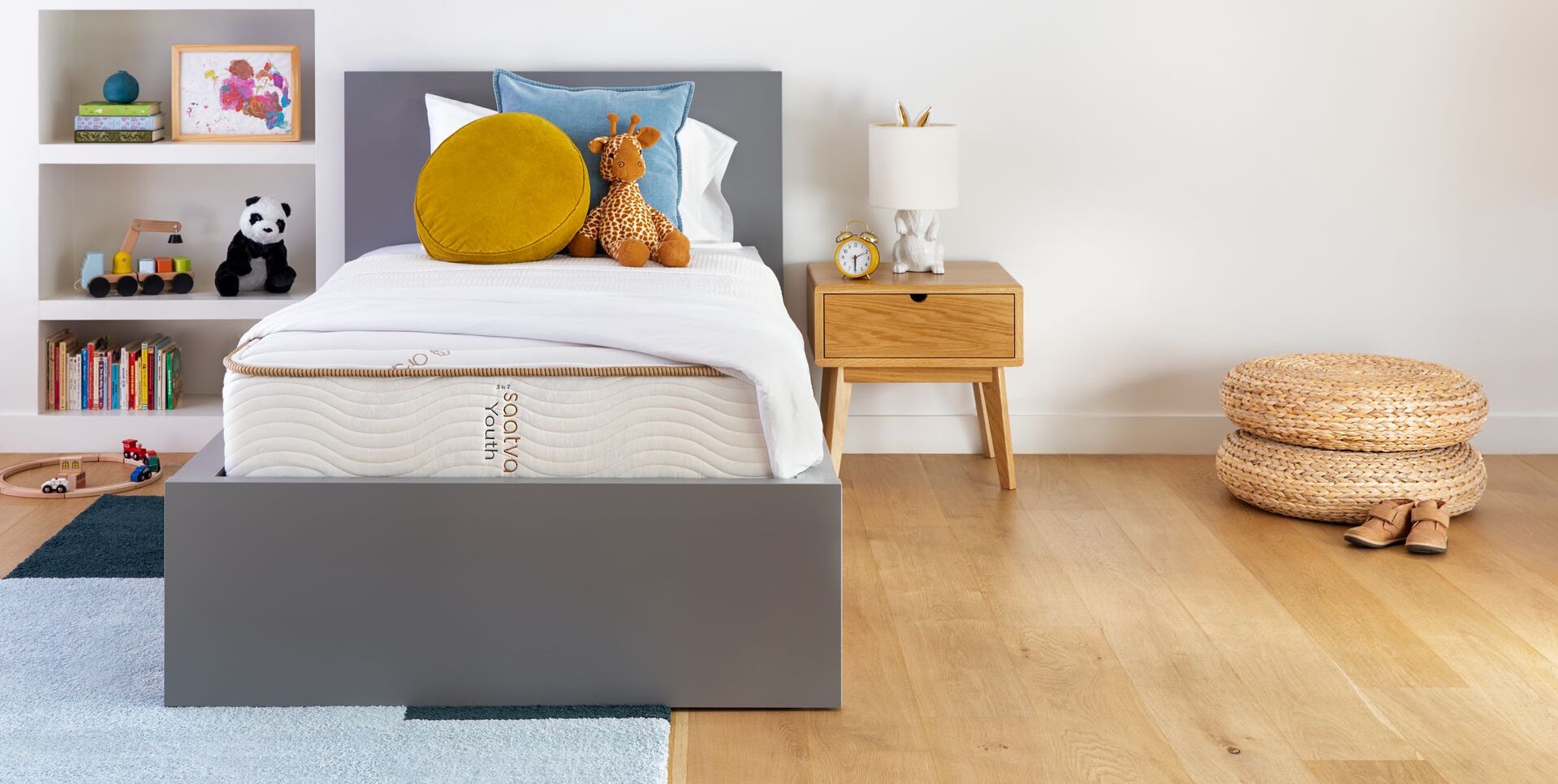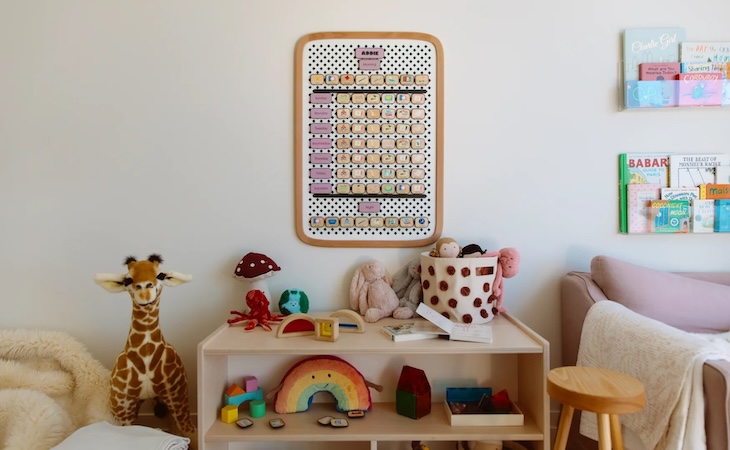With countless parties, no-school days, travel—oh, and the excitement of waiting for Santa—getting your little one(s) to stick to their usual sleep routine during the holidays can be a hurdle for many parents.
Whether you’re flying across the country or hosting extended family in your home, it’s important to try to keep your kids to as much of a schedule as possible. Otherwise, you may be stuck with a new normal that can be difficult to break once your children are forced to get back into their everyday rhythm.
Fortunately, there are several easy ways you can prevent your kids from waking up grouchy Grinches and ensure they’re clocking in enough snooze time throughout this busy season. To help you set some bedtime rules, we tapped Lynelle Schneeberg, PsyD, a pediatric sleep psychologist and author of Become Your Child’s Sleep Coach: The Bedtime Doctor’s 5-Step Guide, Ages 3-10, for her best holiday sleep tips for kids.
Enforce regular bedtime rituals
When you’re attending parties that go into the wee hours, it can be easy for your kids to abandon their regular sleep schedule. Sticking to some sort of routine—even if it’s done later at night than usual—can help ensure they don’t fall too far off track.
“Conditioning plays a big role with kids and sleep,” Schneeberg explains. “I’m a huge fan of routines, so even if the child is going to bed later or in a different place, if you use the same routine as you do at home, it will automatically cue sleep.”
Schneeberg suggests parents follow what she calls the 5Bs: bedtime bite, bath, brush teeth, and books. That means there’s no Netflix in between a nighttime nosh and a bath. Kids can easily get carried away watching a show, and by the time you look up at the clock, it’s way past their bedtime.
Another case for limiting screen time? A 2017 study from the International Journal of Behavioral Nutrition and Physical Activity suggests that kids who use electronics—like a cell phone, TV, or tablet—in bed are more likely to have poorer sleep quality than those who read a book instead. Studies also show that bedtime routines can deepen the bond between parents and their children and aid in cognitive development.
Limit sugar before bed
Speaking of snacks, parents should avoid overloading their kids with gingerbread cookies and candy canes before sleep. Filling them up with the sweet stuff can keep them up (read: wired) at night.
“Oatmeal and peanut butter cookies are fine—or nut butter on toast,” Schneeberg says. “These foods feel comforting and will keep them from waking up at night.” Other kid-friendly snacks for sleep include oatmeal with banana slices, grapes and strawberries, and turkey-and-cheese roll-ups.
Squeeze in a nap during the day
Don’t let a jam-packed social calendar of holiday activities steal nap time from your child. Reminder: Toddlers need at least 12 to 16 hours of sleep, including naps, each day; children ages three to five years old need 10 to 13 hours of sleep; and children six to 12 years old should get nine to 12 hours of sleep, according to the National Sleep Foundation.
If your kids normally nap at home, Schneeberg advises parents stick to the drill and allow their children to snooze anytime between noon and 4 p.m. to avoid possible meltdowns. Otherwise, be prepared to face temper tantrums, a short attention span (parents, raise your hand if you hate repeating yourself), and even illness.
“Kids under four or five years old should nap the same amount they do at home, or under an hour,” Schneeberg says. “Anything more than that can cause sleep inertia, which leads to grogginess.”
Naps have other great health benefits for kids: A 2017 study from the Journal of Pediatric Psychology shows that naps may enhance learning and attention in preschool-aged children. Napping has also been shown to improve cognitive and memory development for children.
Schneeberg says that parents and teens can benefit from afternoon napping too. “Your body expects to nap during this time of day because it releases a bit of melatonin,” she explains. “This won’t have negative effects on your nighttime sleep.”
Related: How much sleep your child needs, according to their age
Focus on rise times when traveling
Traveling across time zones can make falling asleep at night more difficult, but your wake-up times are more predictable and something parents can plan for.
“I focus on rise times,” says Schneeberg. “This sets the clock in your brain. I use clock setters to help me set a new rise time when I travel.” These “clock setters” are activity, sunlight exposure, and food.
For example, if you’re traveling from the east coast to the west, you know your body will be three hours ahead. Chances are, your kids will wake up earlier and not want to go back to bed, but that doesn’t mean you have to get the day started. “I would try not to feed your kids breakfast until 7 a.m. California time or go for a walk until later in the morning,” Schneeberg advises. “Doing these things will throw off your body’s internal clock and might make it more difficult to sleep at night.”
Related: The best (and worst) jet lag cures
Pack comforting items that remind them of home
Whether you’re staying at a hotel or a relative’s home during the holidays, sleeping in unfamiliar places can make snoozing through the night more difficult, even for kids. Schneeberg says it’s important to bring things that remind your children of their sleep routine at home. Packing their stuffed animal, favorite PJs, and a bedtime book will help them sleep better.
If your kids are sharing the same bed with you or a sibling or cousin, make sure each child has their own book and book light. “If everyone has a way to read a book until they’re drowsy, you won’t get into a situation where one kid is fast asleep and the other one is wide awake,” she says.
Related: Here’s why you should read a bedtime story to your child tonight
Set physical boundaries
Schneeberg says kids who are independent sleepers should have their own space, even if they’re sharing a bed. “Place a body pillow or rolled-up blanket between kids,” she suggests. “And if you’re sleeping in the same bed as your kids, this is a good thing because it maintains space between you and the child. If you have a six-year-old, she’ll get used to sleeping next to you and will want to when you get home.” If you’re staying at a hotel, consider using air mattresses or floor beds for kids.
Need advice on how to deal with bedroom battles between siblings? Check out these expert design tips for creating a shared space for your kids.





